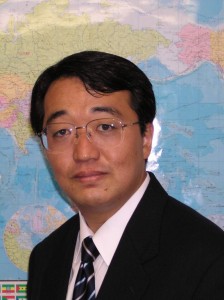緊張と統合:内村鑑三におけるキリスト教と日本の精神
このシリーズでは、私が1994年に執筆した統一神学大学院(Unification Theological Seminary)の神学課程修士論文(Divinity Thesis)を日英二か国語で掲載している。今回から第2章の「アメリカの宣教師と日本のキリスト教徒」に入る。
2.アメリカの宣教師と日本のキリスト教徒
カルロ・カルダローラは、アメリカの宣教師と日本のキリスト教徒の出会いにおける社会心理学的な力学を三つの段階に分けて描写している。それによると第一段階は「幸福な出会い」と呼ばれ、第二段階は「不和の発生と独立の為の戦い」、第三段階は「無教会運動の出現」と呼ばれている。
A.第一段階:幸福な出会い
アメリカの宣教師達は明治日本に対して特別なる責任を感じ、日本にキリスト教を導入する上において格別なる働きをした。彼らの背景はいわゆる大覚醒の精神であり、それはアメリカの運命に関する楽観主義、慈善的行為の実践主義、さらには至福千年説などを特徴としていた。彼らはアジアやアフリカの人々は偶像崇拝と悪徳の暗闇の中にさまよう不幸な群衆であり、もしキリスト教に回心しなければ永遠の地獄の責苦を受けるであろうと信じていた。彼らはアメリカの拡大を神の摂理とみなし、全ての国々に祝福をもたらすことが自国の運命であるとみなしていた。日本へ送られた宣教団の多くは、この様な全般的な宣教に対する情熱が、拡張主義的な関心と融合されて結成されたのである。
基本的にアメリカの宣教師達は、日本人の西洋文化に対する関心を増大させれば、不可避的に日本人はキリスト教を受け入れるようになるであろうという、単純な想定をしていた。彼らの宣教戦略は主として、プロテスタントのキリスト教を受け入れることが国家近代化をめざして安定した出発をする為の基礎になるということを、日本人に確信させようというものであった。かくして、アメリカの宣教師が1850年代の後期に日本に入国したとき、彼らはキリスト者としての深い義務感と、強い文化的自負を持っていたのである。
この訴えに対して最初に反応したのは若き侍達であった。実際、明治初期の日本において傑出したキリスト教徒は、内村を含めて、みな若き侍の改宗者達であった。歴史家達によれば、これらの侍キリスト教徒は、明治政府による武士階級の廃止によってエリートとしての社会的地位を失った者達であり、彼らは総じて維新を支持しなかった藩の出身者であったために、新国家の指導層から排除された者達であった。従ってこれらの侍の子弟達は、プロテスタントの宣教師達によってもたらされた西洋の学問を身につけることによって、失われた社会的特権と指導的な役割を取り戻そうとしたのである。彼らは(ピューリタン)宣教師達の新しい宗教を熱心に受け入れた。なぜなら宣教師達は、キリスト教倫理こそは西洋文化を進歩させ、強力にした土台であると教えたからである。
さらに、これらの初期プロテスタント宣教師達によって示されたピューリタン的倫理の模範は、伝統的な侍の倫理と似たものに映ったために、これらの若き侍の子弟達にとって、回心は根本的な価値観の変更を意味しなかった。家や国家に対する強い責任感に満たされた若き侍にとっては、西洋の知識と文化を利用することが、変わり行く社会において地位を取り戻すには最善の方法と思われた。したがってミッション・スクールにおける教育は、彼らに輝かしい未来を約束する一大特権であると思われたのである。
II. American Missionaries and Japanese Christians
Carlo Caldarola illustrates the socio-psychological dynamics of the encounter between American missionaries and Japanese, dividing it into three phases: the first phase is called “Happy Encounter,” the second is “Development of Incompatibilities and the Struggle for Independence,” the third is “The Emergence of the Non-Church Movement.”
A. First Phase: Happy Encounter
American missionaries played an outstanding role in introducing Christianity to the Meiji Japan, feeling a particular obligation to her. Their background was the spirit of Great Awakening, which was characterized by the feeling of optimism about the American destiny, benevolent activism, and premillenarianism. They believed that the people of Asia and Africa were miserable masses, wandering in the darkness of idolatry and vice; so they would experience the tortures of eternal Hell unless they were converted to Christianity. They saw America’s expansion as the Providence of God, and her destiny to bring blessings on all nations. The Japanese mission was established largely as a result of this generalized missionary fervor, combined with the expansionist interest.(1)
American missionaries basically had a simple assumption: increasing interest in western culture by the Japanese would inevitably lead them to acceptance of the Christian religion. Their evangelizing strategy was aimed primarily at convincing the Japanese to accept Protestant Christianity as the basis for a sound start in modernizing their country. Thus, it was with a deep sense of Christian duty and cultural pride that the American missionaries entered Japan during the late 1850’s.
Those who initially responded to this appeal were young samurai. Indeed, in early Meiji Japan all the outstanding Christians, including Uchimura, were young samurai converts. According to some historians, these samurai Christians, who lost their elite status with the termination of the samurai class by the Meiji government, all had been born in province which had not supported the Restoration and consequently had been excluded as a group from participation in the leadership of the new state. Therefore, these sons of samurai sought to recover their lost social prestige and leadership role by acquiring the Western learning brought by Protestant missionaries. They eagerly embraced the new religion of the (Puritan) missionaries because the latter taught that Christian ethic underlay the progress and strength of Western culture.
Furthermore, because the Puritan ethic exemplified by these early Protestant missionaries appeared similar to their own traditional (samurai) ethic, conversion for these young sons of samurai represented not a fundamental change in values. To a young samurai filled with a strong sense of responsibility toward family and country there seemed no better way to recapture status in the changing world than to utilize western knowledge and culture. Thus, education at a mission school was considered to be a great privilege and to augur a bright future.(2)
(1)Caldarola, pp.23-6.
(2)Caldarola, p.27.
